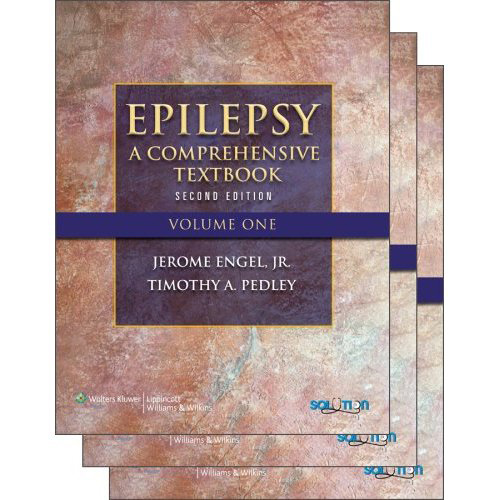Livros Psiquiatria Infantil |
Epilepsy: A Comprehensive Textbook (3-volume set) |
Jerome Engel, Timothy A Pedley, Jean Aicardi, Marc A Dichter, Solomon Moshé |
Lippincott Williams & Wilkins |
 Written and edited by world-renowned authorities, this three-volume work is, to quote a reviewer, "the definitive textbook about seizures and epilepsy". This Second Edition is thoroughly updated and gives you a complete print and multimedia package: the three-volume set plus access to an integrated content Website. More than 300 chapters cover the spectrum of biology, physiology, and clinical information, from molecular biology to public health concerns in developing countries. Included are detailed discussions of seizure types and epilepsy syndromes; relationships between physiology and clinical events; psychiatric and medical comorbidity; conditions that could be mistaken for epilepsy; and an increasing range of pharmacologic, surgical, and alternative therapies, including vagus nerve stimulation and deep brain stimulation. This edition describes many new antiepileptic drugs, major advances in surgical treatment, and state-of-the-art neuroimaging, EEG, and other technologies for diagnosis and seizure prediction. A companion Website offers instant access to the complete, fully searchable text, plus an image bank of additional figures, video footage, and annual updates to selected chapters. "Doody's Core Titles, 2009." Review Journal of the American Medical Association (JAMA), 23-JUL-08, Volume 300, Issue 4, George Lee Morris, III, MD, Regional Epilepsy Center, St. Luke's Medical Center, Milwaukee, WI - "I recommend the second edition of Epilepsy: A Comprehensive Textbook, edited by Engel and Pedley, for its valuable instruction to practitioners who treat seizures...This text belongs on the shelves of any medical library or physician subspecialist. The chapters are a wonderfully manageable size, often not more than a few pages, and address issues that in other texts receive only a paragraph or two, leaving the reader seeking more information elsewhere. The text is well referenced, citing a variety of original source articles rather than reviews. The different writing styles of the contributors are engaging and allow the reader to enjoy this rather unique experience... "The chapters are easy to peruse and tend to have a narrow focus. I find this a desirable feature when looking for a specific issue. The shorter length means fewer references for any given issue, and it is easier to navigate from text to references and back again. I often question the source of a conclusion, moving back and forth between text and references to discover if I need to review a specific reference. The issues in chapters may vary from the more global, as in "Efficacy of Medications," to the specific, as in "Managing the Single Seizure"—both chapters I enthusiastically recommend. Throughout, the text provides more examples of this variation between a specific and a broad topic, making the book useful to a variety of physicians. "The chapters have wonderful writing styles. They include the grand and sweeping concepts of "Broader Aspects of Treatment," which covers seldom-acknowledged bits of knowledge. This chapter is well worth reading for the newer physician before putting pen to prescription pad. "Routine Monitoring for Safety and Tolerability During Chronic Treatment With Antiepileptic Drugs" is likewise efficient and economical, presenting a condensed, detailed review of appropriate practices and maneuvers. Chapters on candidacy for surgery, hormonal changes with epilepsy treatment, and pharmacogenomics are skillfully written and provide a more focused perspective to the advanced reader. While some chapter authors use the approach of simple titles for each section, others have chosen a question to begin each section as though in a discussion with students in a lecture classroom or clinic hallway. "The text includes a wonderful chapter on the role of the European Regulatory Agencies that provides needed insight into the complicated nature of the drug approval process. The section on the issue of the monotherapy indication bears review for epilepsy physicians and others seeking to understand this issue. Since Europeans have different issues in the approval process, the chapter provides the opportunity to expand a newer physician's understanding of the challenges ahead... "These volumes will, as did their predecessor, become dog-eared and well-worn on my shelf. They will, from time to time, disappear and reappear due to collective use. Libraries will find Epilepsy: A Comprehensive Textbook used frequently, fellows will feel it was a good use of their book funds, and many will patiently wait for the inevitable publication of a valuable third edition." — Journal of the American Medical Association (JAMA) |